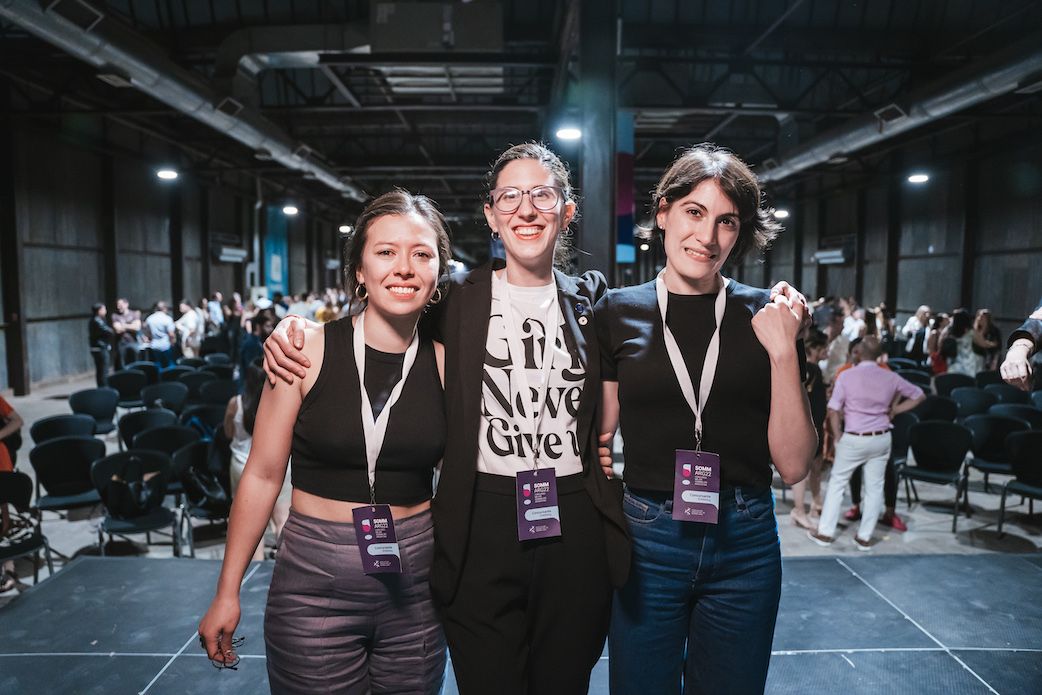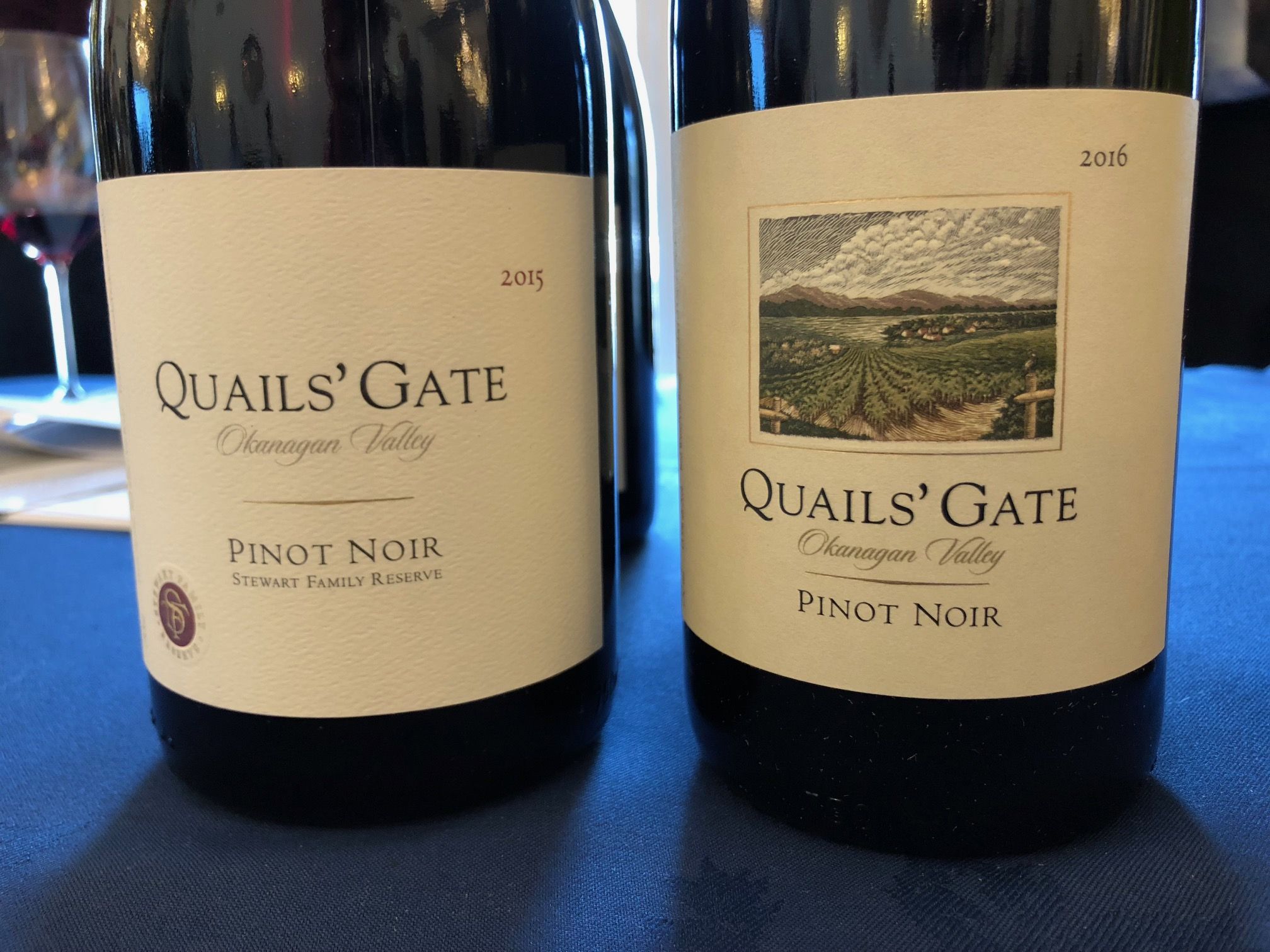“Our fluctuating economy and politics make us resourceful because the context here is always changing. You have to find a way in all things in Argentina,” says CAVE director Flavia Rizzuto.
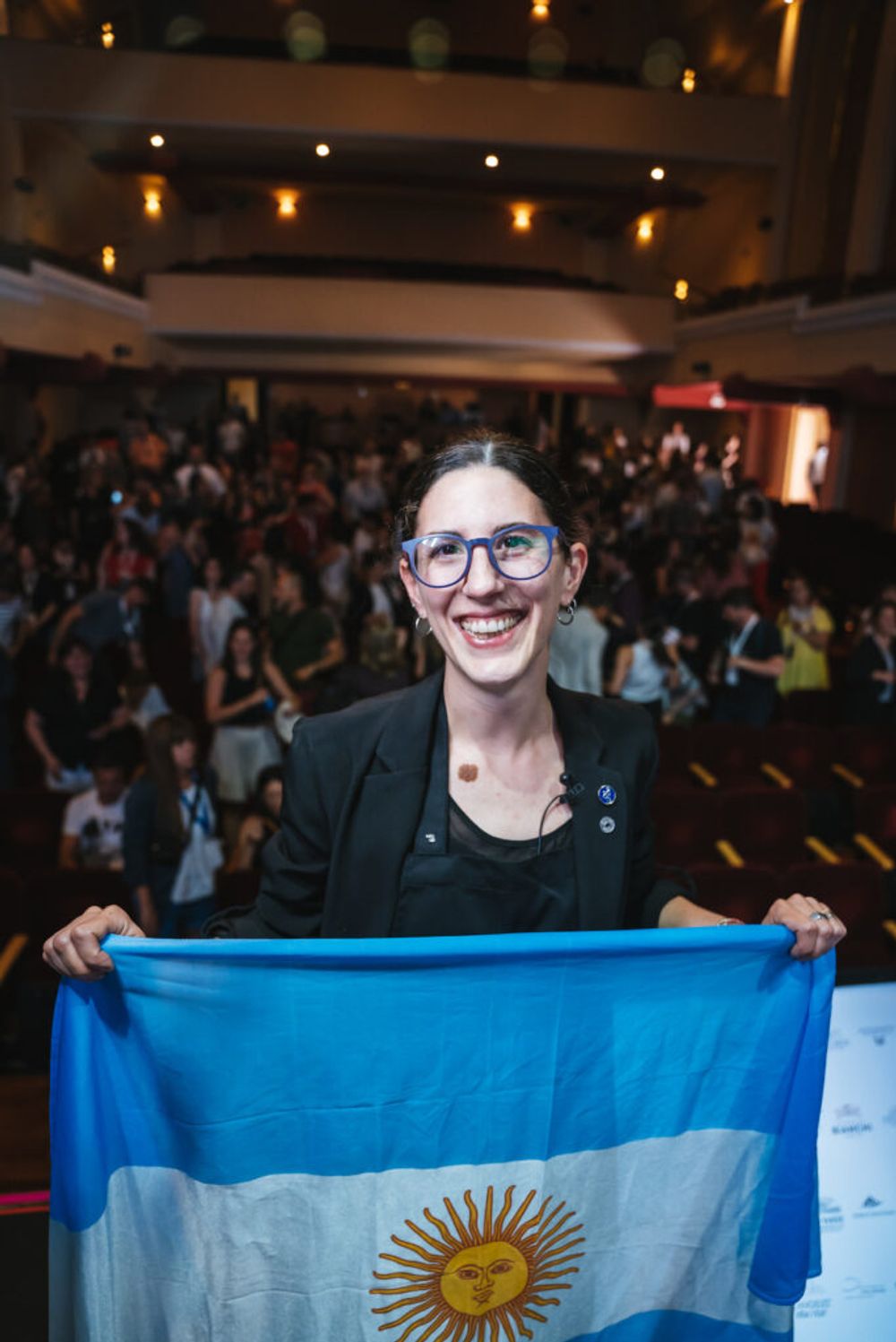
Happy as Messi: Best Somm Argentina 2022 Andrea Donadio
Sex-obsessed somms and supposedly sleazy wine TV pundits make great headline copy, but I have an altogether more wholesome and clean tippler’s tale to impart this Winter Yule…
Question: What do Paz Levinson, Valeria Gamper and Andrea Donadio have in common aside from being winners of the Best Somm Argentina?
Answer: They are all graduates of a very special hospitality school in Buenos Aires known as CAVE (Centro Argentino de Vinos y Espirituosas).
Run on a tiny budget yet operated with immense integrity, by two dedicated industry women, the school places emphasis on nurturing the individual no matter how slender their means. CAVE is populating the planet with world class sommeliers on a shoestring budget. But how do they do it?
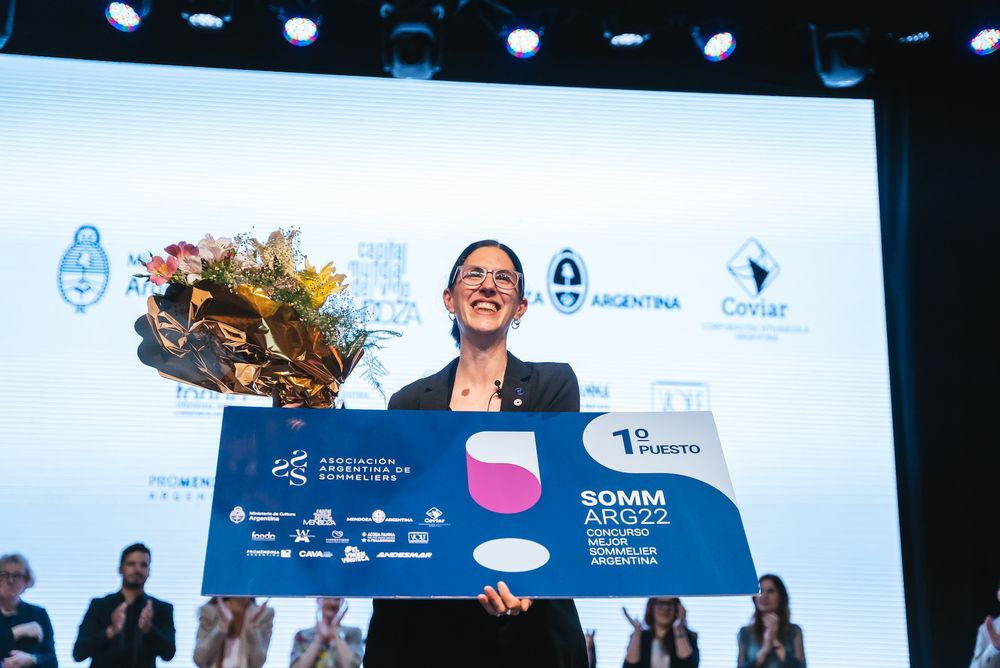
That winning feeling: Best Somm Argentina 2022 Andrea Donadio, November 2022
World class results
CAVE’s three-year course in Buenos Aires has produced some of the world’s highest rated sommeliers. The brainchild of two women, Flavia Rizzuto and Maria Barrutia who used their combined hospitality expertise to construct a bespoke, personalised degree level Somelerie programme and deliver it on a shoestring budget.
Argentina is a financial disaster zone, life there can seem overwhelming. The cycle of boom and bust is bewildering. Inflation is so high that the local peso is a standing joke with one exchange rate for the tourists and an altogether different one for locals. Yet somehow the restaurants are full and the local wine sought after both at home and abroad (Argentinians drink a staggering 80% of the wine they produce). Hospitality is in Argentinian blood. Just like football. It’s difficult to express the sense of sorrow on Mendozan streets when Argentina loses a game – a win is celebrated exuberantly everywhere.
Wine industry stalwart Robin Copestick found himself in Buenos Aires in 1992 when the currency completely collapsed. Chic designer shops on Hausamannesque boulevards had little time to adjust price tags thus enabling Copestick to buy an Yves Saint Laurent suit for the equivalent of a hundred quid. For Argentinians the story is less entertaining. Affording food and board when the costs of living regularly doubles, is no picnic. It was into this economic turmoil Flavia and Maria stepped, determined to create an educational institution dedicated to excellence in hospitality.
Flavia Rizzuto says: “Maria is a sommelier and chef and I am a sommelier. We had both studied industry qualifications but we had learned a lot more from practical training given by colleagues, we wanted to give that back so we set up CAVE. Financially savvy friends warned against getting involved in education but we did it anyway.
Maria Barrutia adds : ‘We don’t charge a high amount because 70% of the people who study at CAVE are from restaurants or hotels and wages are low. They pay about $60 per month and that’s for 10 months of the year. In 2020 during the epidemic many of them had no work, in March they were working, by April they were on the street. We decided to let them study without paying, it was the only thing they had.
Rizzuto says “lockdown was tough but it also made us adapt”. She adds: “We don’t have sponsors at CAVE but we know all of the wineries so Maria and I decided it was time to ask the wineries for help. We introduced individual students to individual wineries and they acted as Godmothers or Godfathers, they helped them for six to eight months of lockdown. We also reduced the fees by 30% so people’s debts were smaller and they were less worried.”
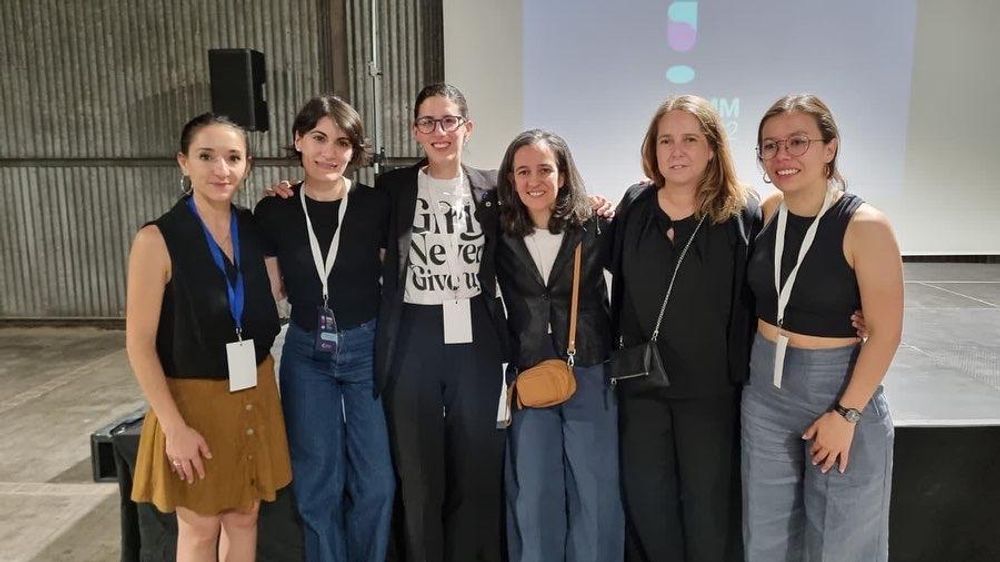
(l-r) Valeria Gamper, Alma Cabral, Andrea Donadio, Maria Barrutia, Flavia Rizzuto and Delvis Huck
Mentoring and community is essential to the CAVE training model. CAVE students are encouraged to participate in competitions no matter how small their chance of winning.
Valeria Gamper is a CAVE graduate, Argentina’s top Sommelier of 2019 and Somm of the Americas 2022, she helped Andy Donadio train for this year’s competition. She says: “At CAVE during the first year we studied viticulture, oenology then geography and food and wine pairings. Andy and I studied together. I went to three competitions before I won. The point is I needed to fail to succeed. The most difficult thing is managing the nerves, you have to forget about the audience. Winning is just the beginning. I realised that if it opens doors for me I can open doors for others too. A lot of people have helped me and now I have a chance to help others.”
Barrutia adds: “We work with all of our students on competing, those that are experienced and those that are not, we create a network so they can learn from each other. Sometimes we work one to one to manage stress. We examine the strengths and we examine the weaknesses. We tell them to think of it as an experience – many say, ‘It’s the last time I’m doing that!’. We say, you’ll know it’s the last time when you finish the contest and you are happy, that’s when you know you have done your best’.”
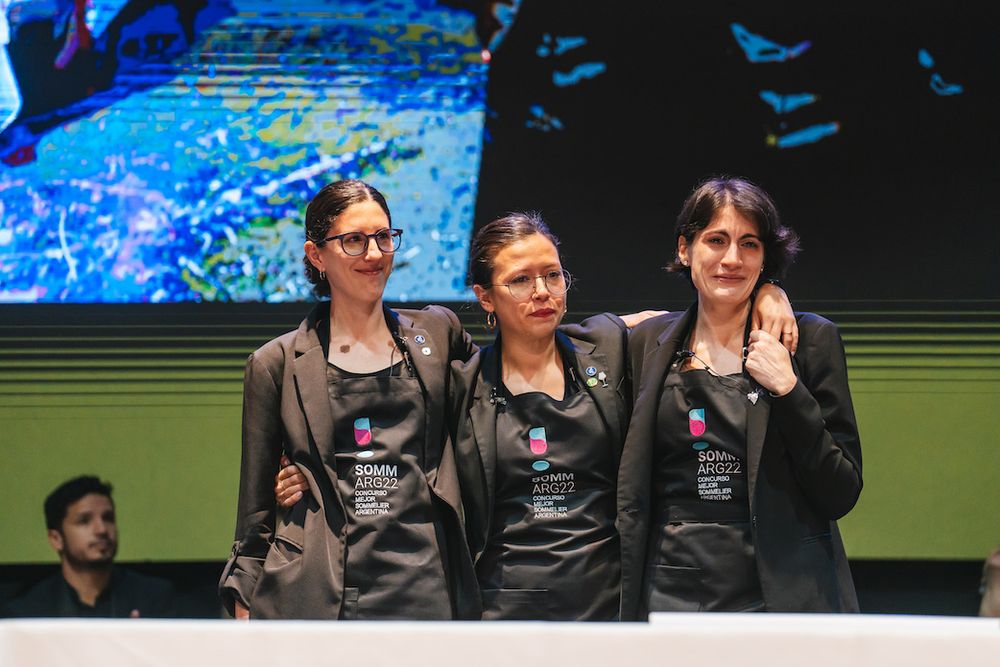
(l-r) Best Somm Argentina 2022 Andrea Donadio, with runners up Delvis Huck and Alma Cabral
For the Arg Somm final 2022 questions were tough, the three remaining candidates began by describing three different whites live on stage, then they had to match three rocks denoting soil types to each respective wine.
Andi Donadio knew at this point she’d misidentified the wines. “It was a crazy task but it was so interesting. When I saw the rocks, I knew the first wine was Riesling, and the granite was Albariño and the schist – it was a Sancerre. I knew I’d got the wines wrong at that point but I really enjoyed it. I’ve competed before, when I wasn’t ready to win, this time was different. It’s very important to know you will make a lot of mistakes, little and big but you have to remember that mistakes won’t mark your career,” she explains.
“I know confusing a Chardonnay with an Albariño is a really really stupid mistake. But I was doing my best – remember that whatever happens you will be a professional sommelier but you are also a human being and we make mistakes,” she adds.
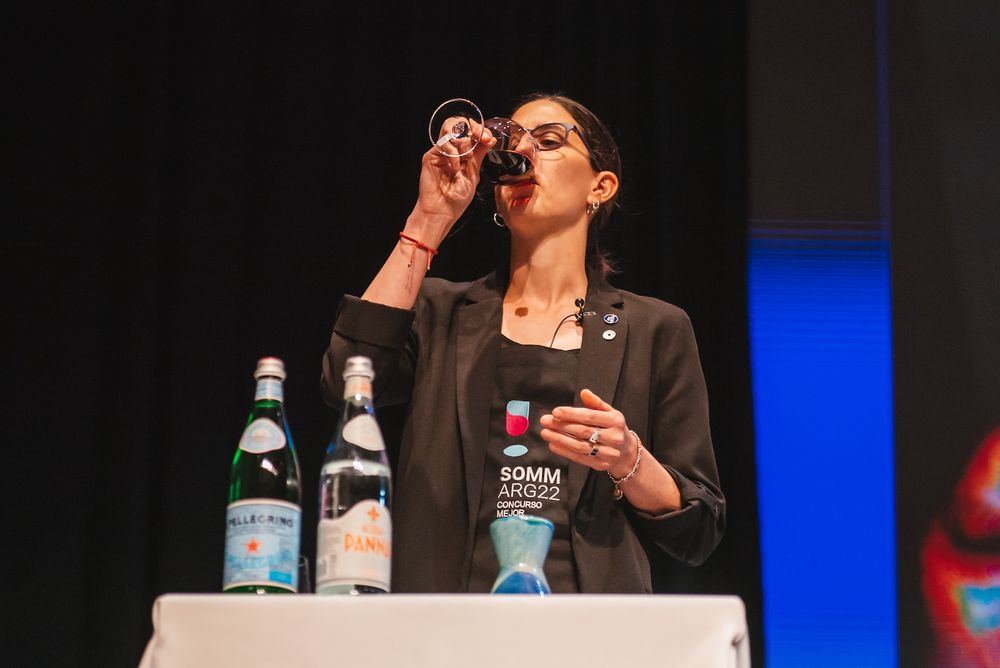
It’s the taking part that counts: “remember you are also human being and we make mistakes.”
Barrutia adds: “Our sommeliers can work at wineries, at importers, they work all over the world thanks to the skills they learn at CAVE. We are a small institution and the curriculum is very personalised, that is absolutely how we teach, it’s the way we do it. We offer students both virtual and classroom-based classes. This week the first four of our sommeliers qualified via distance learning, they did just as well as the classroom-based students.”
Today they have students in Europe, Peru and Uruguay and many in Argentina. Interestingly they have 50% women and 50% per cent men on the course. I looked up the number of female Master Sommeliers and it’s 25 out of 143 total. It’s clear that this kind of supportive collaborative environment – the kind that sees failure as a necessary part of success would be beneficial to anyone, no matter what their gender.
Rizzuto adds: “Many of the people that come to study already have families, they work so we let everyone study at their own pace. We encourage people to postpone and return. Should you fail an exam you will find it’s the best way to learn, you never forget that wine again. We tell them it’s not important how high your marks are, you have lives outside of this, that is important.
“Be grateful you can choose this career later in life – that you can do something you truly love. Sometimes we have lawyers or bankers come to us to train and we say, don’t leave your career, wait because you won’t earn the same, first you will have to do both things – it’s a big responsibility for us. But wine is something we all love, to go home at night happy, knowing you are doing something that you like is very valuable indeed.”
She sums up the mission and purpose of what CAVE hopes to offer: “It’s the worst time in Argentina but we are high in spirits. If we are in Argentina – we choose to be here, we have choices, there are people in the world that have no choices – as a sommelier you can choose where to work and where to live. We drink a lot of wine and our winemakers have travelled the world and share their knowledge – community raises standards, if we unite we learn more. Our fluctuating economy and politics make us resourceful because the context here is always changing. You have to find a way in all things in Argentina.”
- You can find out more about what CAVE and what it offers at its website here.
